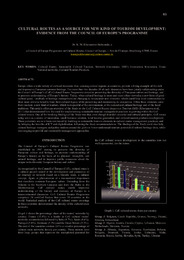Cultural Routes as a Source for New Kind of Tourism Development: Evidence from the Council of Europe's Programme
Abstract
Europe offers a wide variety of cultural itineraries that, crossing several regions or countries, provide a living example of the rich and impressive European common heritage. For more than two decades 24 of such itineraries have been jointly collaborating under the Council of Europe's (CoE) Cultural Routes Programme aimed at preserving the diversity of European culture and heritage, and to promote understanding of Europe's history. Today, when cultural heritage is more and more often viewed as a new form of good - cultural good, - methods of heritage management are changing to incorporate new elements, which could help local communities to draw more obvious benefits from their cultural legacy while preserving and maintaining its uniqueness. Often these elements come from tourism: a new kind of tourism, which is respectful of the environment, of the natural and cultural heritage and of the local traditions. This article offers an overview of the Study on the CoE Cultural Routes Impact on Tourism SMEs (Khovanova et al., 2011) that demonstrated how the need for implementing sustainable tourism management practices is growing within the CoE cultural routes. One of the breaking findings of the Study was that, even though founded on social and cultural principles, CoE routes today serve as a source of innovation, small business creation, local income generation, and cultural tourism products development. These potentials are now been reinforced by building in sustainable tourism elements in cultural routes management practices, and by bringing the benefits of ICT and digitalization, following the Study recommendations. The findings of the Study could also help cultural heritage managers and policy makers around the globe to better understand tourism potential of cultural heritage sites, while encouraging respectful and sustainable management approaches.
Collections
- Συνέδριο Euromed [68]
